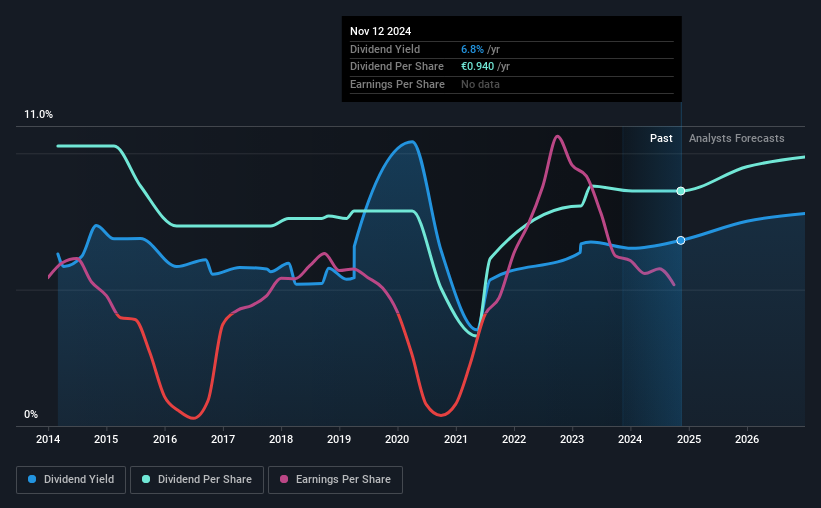
Eni S.p.A. (BIT:ENI) stock is about to trade ex-dividend in 4 days. The ex-dividend date occurs one day before the record date which is the day on which shareholders need to be on the company's books in order to receive a dividend. The ex-dividend date is important because any transaction on a stock needs to have been settled before the record date in order to be eligible for a dividend. Accordingly, Eni investors that purchase the stock on or after the 18th of November will not receive the dividend, which will be paid on the 20th of November.
The company's next dividend payment will be €0.25 per share, and in the last 12 months, the company paid a total of €0.94 per share. Calculating the last year's worth of payments shows that Eni has a trailing yield of 6.8% on the current share price of €13.812. Dividends are a major contributor to investment returns for long term holders, but only if the dividend continues to be paid. As a result, readers should always check whether Eni has been able to grow its dividends, or if the dividend might be cut.
See our latest analysis for Eni
Dividends are usually paid out of company profits, so if a company pays out more than it earned then its dividend is usually at greater risk of being cut. That's why it's good to see Eni paying out a modest 30% of its earnings. A useful secondary check can be to evaluate whether Eni generated enough free cash flow to afford its dividend. Dividends consumed 63% of the company's free cash flow last year, which is within a normal range for most dividend-paying organisations.
It's encouraging to see that the dividend is covered by both profit and cash flow. This generally suggests the dividend is sustainable, as long as earnings don't drop precipitously.
Click here to see the company's payout ratio, plus analyst estimates of its future dividends.

Have Earnings And Dividends Been Growing?
Businesses with shrinking earnings are tricky from a dividend perspective. If earnings fall far enough, the company could be forced to cut its dividend. Readers will understand then, why we're concerned to see Eni's earnings per share have dropped 7.3% a year over the past five years. Such a sharp decline casts doubt on the future sustainability of the dividend.
Many investors will assess a company's dividend performance by evaluating how much the dividend payments have changed over time. Eni has seen its dividend decline 1.7% per annum on average over the past 10 years, which is not great to see.
To Sum It Up
Is Eni worth buying for its dividend? Its earnings per share have been declining meaningfully, although it is paying out less than half its income and more than half its cash flow as dividends. Neither payout ratio appears an immediate concern, but we're concerned about the earnings. Overall, it's hard to get excited about Eni from a dividend perspective.
If you're not too concerned about Eni's ability to pay dividends, you should still be mindful of some of the other risks that this business faces. In terms of investment risks, we've identified 3 warning signs with Eni and understanding them should be part of your investment process.
A common investing mistake is buying the first interesting stock you see. Here you can find a full list of high-yield dividend stocks.
Valuation is complex, but we're here to simplify it.
Discover if Eni might be undervalued or overvalued with our detailed analysis, featuring fair value estimates, potential risks, dividends, insider trades, and its financial condition.
Access Free AnalysisHave feedback on this article? Concerned about the content? Get in touch with us directly. Alternatively, email editorial-team (at) simplywallst.com.
This article by Simply Wall St is general in nature. We provide commentary based on historical data and analyst forecasts only using an unbiased methodology and our articles are not intended to be financial advice. It does not constitute a recommendation to buy or sell any stock, and does not take account of your objectives, or your financial situation. We aim to bring you long-term focused analysis driven by fundamental data. Note that our analysis may not factor in the latest price-sensitive company announcements or qualitative material. Simply Wall St has no position in any stocks mentioned.
About BIT:ENI
Adequate balance sheet average dividend payer.
Similar Companies
Market Insights
Community Narratives



